Modern horror movies had a basis in fact, but they had never gone far enough. The devices they had built into the Rose Castle hundreds of years ago were even more sophisticated than those the Nazis designed. Even then they had known about tolerance levels for pain and invented machines that could break any human’s endurance. There were implements whose purpose was so apparent that any woman seeing them would go into hysteria. What they had thought of to do to a male even gave me a squeamish feeling in my stomach and I was there as a guest. But they had been neat about it. Blood troughs and receptacles were all at hand to protect the interrogators, and wooden benches and tables were placed for the benefit of audience participation.
It was all very interesting and I nodded in rapt appreciation at Fucilla’s vivid description of each piece of equipment. But what I was really interested in was our progress through the rooms to the one whose heavy door muffled the steady thump-thump of a gasoline engine turning over a generator.
When we had completed the tour and the grim look on my face satisfied Fucilla, we retraced our steps and went back up the hand-hewed staircase to the landing where Fucilla pushed down a locking handle in the beam and pulled the granite slab inward with the iron ring built into its face.
“Now then,” he had said, “We will see those we came to see.”
There had been twelve of them held there, each in his own room behind solid wooden doors with an inch-wide peephole built into it to check on the occupant. The quarters had been furnished lavishly for a prison, more like one-room apartments than like normal cells. But these were political prisoners and the intent was a psychological one. It kept them from realizing their true status, allowing them to maintain a futile hope in the midst of despair. Once they were subjugated to narcotics, control was complete. Alive, they were a source of revenue or political advantage, always available for negotiation, forced to act as Ortega wished them to unless they wanted to suffer the pain and possible death of narcotics withdrawal.
Victor Sable had surprised me. Prison life had barely touched him at all. He had been sitting at his desk writing in longhand, his face in serious thought. Except for a slight balding, he matched the photos I had seen. There was no doubting his identity. The single light bulb had thrown his face into sharp relief and I had recognized both profile and front-face views.
I had deliberately taken a certain amount of time inspecting each prisoner so that when I reached Sable nothing was unusual, but once having recognized him I was more concerned with the locks on the door than I was the man inside. When I was satisfied, I had passed on to the next room and the next, without Fucilla ever realizing what I had come for.
If only the weather would hold off, I thought. Absently, I remembered Miami Advisory had named her Frances.
I parked the Volvo in the hotel lot at eleven fifteen, lost myself in the traffic that was going in and out of the main doors and got myself a place at the crowded end of the bar. It took another ten minutes before one of the casino guards spotted me, walked over and spoke hurriedly to the one near the desk, who looked my way with a confused frown and decided to see what was going on.
I made a point of ignoring him while he edged in next to me and ordered a drink. He finally turned and said, “You have been enjoying yourself, señor?”
“In a way.”
“We have missed you at the tables.”
“I was sick.” I let out a shudder to prove the point. “I got me some fresh air. Feel a lot better now.”
He was glad enough to see me back without pressing the point. “Perhaps it would be better if you slept.”
I finished my drink and put the glass back on the bar. “You may be right at that,” I said. I told him good night and reached the elevators. In the reflection of the glass over the calendar of events I could see him still watching my back, the bar phone at his ear to alert the guard on my floor that I was coming up.
As I touched the button I heard the whine of a siren clearing a path to the front door. Four of the bellboys pulled themselves away from their conclave at the desk and hurried outside. The few of us waiting for the elevator stepped back to see what it was all about and watched while the doors were pushed inward and five men followed by an assortment of crisp, efficient-looking women entered, the bellhops trailing with red-and-white foot lockers.
The man next to me said, “They finally got here.”
“Who?”
“Volunteer medics from Miami.”
“They’re setting up an emergency field hospital. One thing this place hasn’t got and that’s enough doctors. Those guys have a lot of guts.” He grinned at me. “They could have brought some better-looking nurses.”
“What are they doing here?”
“You hear a late advisory?”
“Damn right. Those slobs have been holding it back, but somebody passed the word that it’s closer than they’re letting on. I’m damn glad I’m getting out. This blow’s got trouble in it. The next flight’s the last one leaving. After that it’s storm-shelter time.”
“You sure about that next flight?”
He gave a serious twist of his head. “Check with the desk. Everything else is canceled out.” He looked at me curiously. “You on it?”
“No.”
“Tough,” he said.
I looked at the group going past me, their faces grimly professional. One was in his late twenties and three were well past middle age. All of the women were in their middle thirties. But one of the men had a grim professional look and he wasn’t a doctor. His expensive gray suit was well tailored to his hulking form, the snap-brim of the fedora half shading his eyes. He carried the trench coat over his arm in a practiced way that looked natural, but put his hand near the gun he always carried. He didn’t hurry. He didn’t have to. What he came for was still here and not about to leave.
I said his name silently, feeling it roll across my tongue, tasting the sensation of killing him. The man was Whitey Tass.
At the fifth floor I got out alone and walked down the corridor toward my room. At the other end the lone sentry trying so hard to be a part of the scenery saw me and turned away casually to resume his aimless strolling. I rapped on the door, heard a startled grunt and feet cross the room. A muffied voice said, “Yes?”
“Morg. Open up.”
Joey Jolley had almost gone to pieces. His face was drained of color and his hands were too shaky to throw the bolt in place, so I had to do it for him. Inside, the radio was blaring away with loud, cheerful music.
I looked at my watch. It was five after twelve.
“Where’s Kim?” I motioned for him to keep his voice down.
“She… did what you told her to. She’s still there.”
This time I had to take the chance that they were too busy to monitor my phone. I dialed Lisa’s room, heard it ring twice before it was picked up and a listless voice answered with a hello. I said, “Morg, kitten. Come on home,” then hung up.
I looked at my watch again and the hands seemed to be double-timing around the dial. Somehow, Kim had made her own way to Lisa’s room unobserved and somehow she’d make it back. However she pulled the guard off balance was her own affair, but I couldn’t afford the waste of even a minute.
Once more I had to hope Lady Luck was riding my horse. I picked up the phone and dialed Room 203. After it rang a half-dozen times a pleasant voice answered with “Si?”
“Luis Rondo?” I asked in English.
“Yes,” he answered, “this is he.”
“My name is Winters, Mr. Rondo. Your services have been recommended to me by a friend.”
Читать дальше
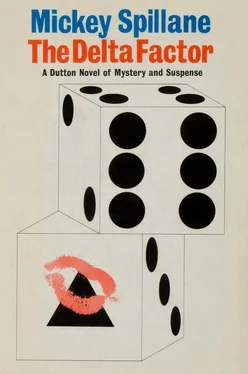
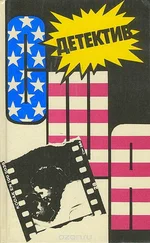

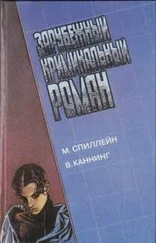

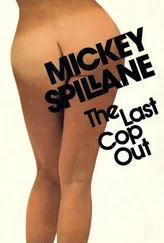
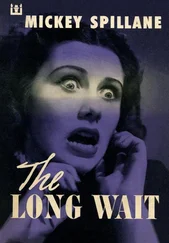
![Микки Спиллейн - Death of the Too-Cute Prostitute [= Man Alone]](/books/437201/mikki-spillejn-death-of-the-too-thumb.webp)